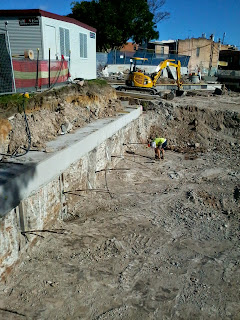I am now in my second week of going back to school to get a Bachelor of Nursing degree from University of Technology Sydney. There are about 800 students in my class, and it seems more are international students than students born in Australia. Unfortunately, I am paying 3x normal tuition because I am an international student, having not yet become a permanent resident. I've been out of work too long and am too old to waste any more time waiting, since getting employment has been more challenging than expected.
In our first week of class, we are given a huge volume of reading; lab policies, state policies regarding nursing, national standards, information about vaccines and police checks, and last but not least, volumes of homework reading. All of this reading comes in a variety of formats. Some publishers are still not on board with digital, so there are two huge, heavy text books, and a couple of smaller ones, there are pdfs, there are web sites with reading, there are journal articles that must be accessed through the library web portal, and there is a paper handout or two. Instructors are assigning reading snippets here and there in the textbooks, rather than following the published order.
Since international students contribute so much tuition cash, there is a lot of money put into advertising to attract them, and quite a flashy welcome. There are a lot of resources committed to getting students up to speed with writing quality. There is counseling for those who are homesick. Though all of the students understand English as a condition of admission, a fair number have apparently not conversed extensively in English.
One of the big challenges for everyone - it seems staff and the university included - is getting everything organized in the era of "THE CLOUD". The university is using a program called Blackboard. It's a good, comprehensive database connected to a typical, designed-by-accretion (which means messy and visually distracting) interface. To find anything for a class requires digging through multiple folders, and lots of links appear that are actually empty, not having yet been filled. I've found that the Android and iTunes Apps are actually much cleaner than the browser interface. However, then there's the matter of organizing your reading and downloads; keeping track of what you've read, and having it in a form convenient to refer to later. This is complicated by the fact that some files have different types of Digital Rights Management (DRM), so my efforts to download everything and keep it in one place is not an option. My anxiety at being behind in reading was compounded when in one class, the teacher held up printouts of required reading - which was not the same reading I thought I needed. I still haven't located in Blackboard the reading she held up.
One student said she's using iCloud - downloading everything into folders, then changing the color of the files as she completes the reading. Though organizing files in Android's "My Library" is pretty straightforward, moving files around in Android folders themselves is pretty clunky. Initially I used Evernote to keep some files; I haven't tried Google Drive (which might organize more effectively IF I can get various formats downloaded into it). The school doesn't expect everyone to have computers and tablets, and has invested heavily in rows and rows of computers for students to use. Admin has set up every student with an online desktop. You don't see this when you log in from home (you see the messy Blackboard interface, or one of dozens of other facility home pages), It's clear when you log into a school computer that perhaps it might be possible to organize things better from the desktop they've set up. That would be a great irony if THE CLOUD, in the process of liberating our data and making it multi-platform, is actually requiring us all to sit at the computer banks at school rather than accessing it from anywhere. Hmmm... I suppose there's a way to access that desktop from home - but I don't have time to mess with it. I need to focus on extracting required reading through Blackboard, since assignments are coming due!
Summary: the material isn't a challenge; the volume is a bit of a challenge; but the greatest challenge is accessing and organizing all of it. THE CLOUD is currently giving me a headache!


